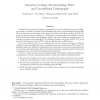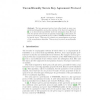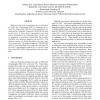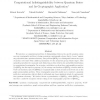103 search results - page 5 / 21 » Unconditionally secure cryptosystems based on quantum crypto... |
CRYPTO
2010
Springer
13 years 8 months ago
2010
Springer
Motivated by the question of basing cryptographic protocols on stateless tamper-proof hardware tokens, we revisit the question of unconditional two-prover zero-knowledge proofs fo...
IMA
2001
Springer
13 years 12 months ago
2001
Springer
Abstract. The key agreement protocol are either based on some computational infeasability, such as the calculus of the discrete logarithm in [1], or on theoretical impossibility un...
DATE
2008
IEEE
14 years 1 months ago
2008
IEEE
Algebraic torus-based cryptosystems are an alternative for Public-Key Cryptography (PKC). It maintains the security of a larger group while the actual computations are performed i...
IMA
2005
Springer
14 years 29 days ago
2005
Springer
In recent years cryptographic protocols based on the Weil and Tate pairings on elliptic curves have attracted much attention. A notable success in this area was the elegant solutio...
EUROCRYPT
2005
Springer
14 years 1 months ago
2005
Springer
We introduce a computational problem of distinguishing between two specific quantum states as a new cryptographic problem to design a quantum cryptographic scheme that is “secu...




